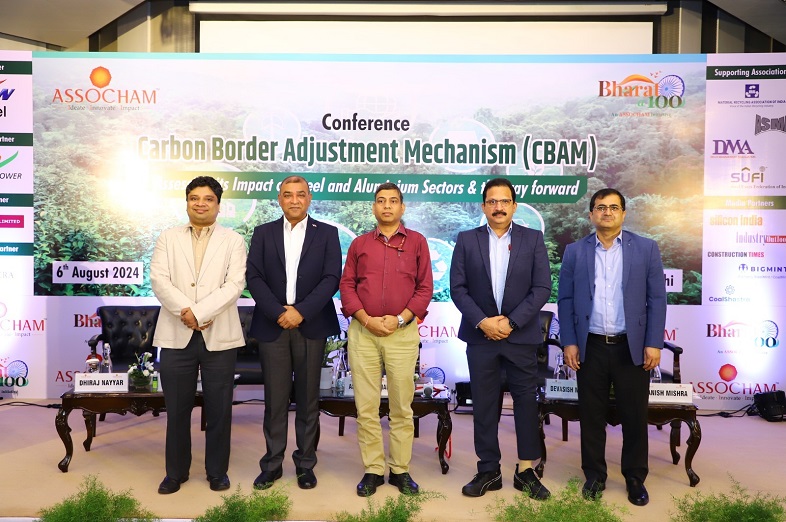Green Transition could revolutionize the Steel Industry in India: Ashwini Kumar, Economic Advisor, Ministry of Steel

6th August 2024, New Delhi: The Indian steel industry is at the brightest spot in world stage scenario said Chief Guest Mr. Ashwini Kumar, Economic Advisor, Ministry of Steel, Govt of India addressing the Conference on Carbon Border Adjustment Mechanism (CBAM) hosted by ASSOCHAM. We are looking forward to the expansion of the steel industry and a robust economy with strong fundamentals, infrastructure, and construction. There are certain challenges to overcome like how to improve a good carbon footprint. We are standing at 2.5 tonnes of CO2 emission per tonne of crude steel which is a cause of inadequate gas resources and other factors. India is forced to do decarbonization before development with constant optimization. Green transition is necessary to achieve goals safeguarding climate. Least fastest way is recycling scrap, India’s steel consumption is low, so scrap is imported. To achieve these green transitions resources are less like access to technology, Intellectual Property strict regime for green technology, and cost structure is high.
Let’s work to create CCTS (Carbon Credit Trading System) and enhance our production systems and decarbonization effectiveness. He went on, “Industry should make an effort to give us the emissions data so that the Ministry of Steel can take the appropriate action.” Incorporate cross-learning sessions as well for a deeper comprehension of the steel industry overall. When considering Indian clusters for green transition, the steel industry needs to be given careful consideration, he added.
In his welcome address Mr. Sabyasachi Bandyopadhyay, Co-Chairman, ASSOCHAM National Council on Iron & Steel, Director, Technical Marketing & Innovation, Jindal Steel & Power Ltd stressed on impact of 0.5% of GDP because of CBAM in India and how it will impose additional taxes of 20-35% shortly. He highlighted the concern that new rules will impact various sectors and the economy as a whole. He called for a disciplined and strategic approach to adapting to these changes and encouraged individuals to consider their role in contributing to a better world.
Mr. Devasish Mishra, Executive Vice President, PDQC & TE (Steel, Mills & SS), JSW Steel Ltd. outlined the goal of new regulations aimed at addressing carbon leakages and ensuring that products meet stringent environmental standards. Mr. Mishra highlighted the challenges faced by the steel and aluminum industries in balancing industrial competitiveness and sustainability, as they are major contributors to carbon emissions. He also mentioned that the new European Union regulations necessities a comprehensive reassessment of production processes and carbon footprints.
Mr. Manish Mishra, Chief Corporate Affairs, Tata Steel Limited, shared insights on the impact of CBAM on the Steel Sector, focusing on implications for global supply chains, trade agreements, and commodity markets at the Carbon Border Adjustment Mechanism (CBAM) Conference. He highlighted how sustainability is shaping business operations and stressed the need to weave CBAM into business strategies, technology choices, and investment plans. Mr. Mishra also addressed the EU’s carbon pricing mechanism, the allocation of free allowances, and the challenges posed by cost increases and compliance requirements.
Mr Dhiraj Nayyar, Group Director- Economics and Policy, Vedanta Ltd said for India priority should be fixing the manufacturing sector, creating jobs, raising per capita income, and becoming the third largest economy in the world in two or three years. The challenge remains in manufacturing for industrial competitiveness. Ultimately a carbon credit trading scheme, you know, will, will help streamline carbon taxation and support effective government, he said.
A comprehensive report on “Cleaning up the Act: India under CBAM: High Exposure in Steel and Aluminium Sectors,” was unveiled Jointly prepared by ASSOCHAM and ICRA at the session.
